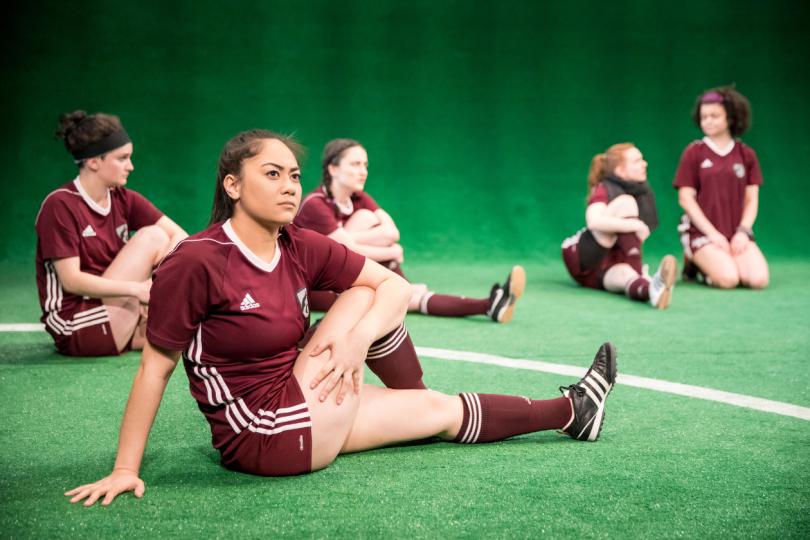Fierce, Fast, Femme:

Theater might not seem like the fiercest of human endeavors, at least from an outside perspective; but those inside the trade, like The Jungle Theater’s Sarah Rasmussen, know better. She had fight to produce “The Wolves,” a 2017 Pulitzer-finalist by Sara DeLappe about a girls’ soccer team in the suburban midwest, after the play’s publisher decided to award just three sets of production rights to theaters outside New York. Shame that honest theater towns like Minneapolis and Chicago have to fight for scraps off of New York’s dining room table, but it was perhaps a fitting start to the show’s Twin Cities debut, which, directed by Rasmussen and played by a dynamic and eclectic all-female ensemble, is a feisty and brisk production well worth its salt.
The lights pop on at the start: nine girls stretch on an astroturf-covered stage, introducing the play’s sole setting. Though they’re just warming up physically, they’re firing on all cylinders socially, debating whether an elderly man who once led Khmer Rouge atrocities in Cambodia should be tried retroactively for his crimes. Heavy stuff for sixteen year-olds, but the girls punctuate their discussion of moral ambiguity with playful digs at each other, and naive wonderings about anatomy. Much of their verbal sparring hinges on what we know, or don’t know, about current events and history. “I can’t believe you didn’t know that already,” the age-old adolescent retort, has an infinite well of ammo in the age of the internet.
Megan Burns’ character, #46, sits agape as the conversation careens from whether there’s Skype in Thailand to whether the team’s slovenly male coach is still drunk from the night before. #46 is new in town, and lives with her mother, where she is homeschooled “in, like, a yogurt” (a yurt). She knows a lot about birds, and geography, and next to nothing about being cool: she’s The Weird New Girl, who, in many stories -- especially high school girl stories -- offers the possibility of overturning the existing order.
In addition to The New Girl, there are other stock characters: The Queen Bee (#7, Becca Hart), The Goodie Two-Shoes (#2, Meredith Casey), and The Tomboy (#13, McKenna Kelly-Eiding), for example. Though DeLappe is trafficking in stereotypes here, à la “Mean Girls,” or “Clueless,” she sketches the characters more as archetypes with hidden edges, and each one is brought to life in complicated and surprising ways by the actors. There’s a softness beneath the vocal fry and eye-rolling of Becca Hart’s #7 (which we eventually learn is guarded for good reason), and for all of #13’s macho ribbing, you can tell by the way she trails off at times that she yearns for deeper connections than those afforded by locker room banter. Like many of the best television shows since “The Wire,” “The Wolves” weaves a narrative rather than carving one, the threads of overlapping dialogue slowly conjuring a complex world that is defined by the interplay of voices and yearnings, rather than one character’s struggle to triumph over obstacles. The central character, you might say, is the very je ne sais quoi that knits The Wolves together and makes them not just a team but a pack.
The girls’ rapid-fire, highly tangential banter mimics modern-day discourse quite effectively: it’s like a highly educated yet completely unregulated group text, where the lines between fact and opinion, earnestness and snark, banality and brutality rearrange themselves in endless combinations. Though the play is cacophonous at times, the actors are so interesting in their physicality that you don’t much mind. Shelby Rose Richardson is particularly compelling as the team captain, squirming to quell her own timidity and fill the void left by their absentee male coaches.
Much of the dialogue focuses on the juxtaposition of brutality and banality in our modern world. A particularly memorable scene begins with Rosey Lowe’s #8 setting off a new round of tangential debates by yelling, “I’m talking about Mexican children in cages!” But unlike many playwrights who take on brutality as a theme, like Martin McDonagh or Adam Rapp, who put physical violence front and center, violence in “The Wolves” threatens and taunts from offstage. What’s far more compelling is how the girls support each other as they grapple with the violence that a misogyny forces upon them. Patriarchy is definitely a thing in their world, but DeLappe never gives it the last word.
When tragedy strikes in the show’s latter half, the play resists falling back on platitudes about sport or the the triumph of the human will. Jennifer Blagen makes a last-second appearance as a bereaved mother, laying bare the existential questions the girls have, up to this point, successfully dribbled around—but the questions aren’t answered. Instead, they hang in the air, as the girls charge onto the field once more.
We still don’t have answers to the big questions, in spite of having all the knowledge at our fingertips. “The Wolves” reminds us that, even so, some things will always be worth fighting for.


